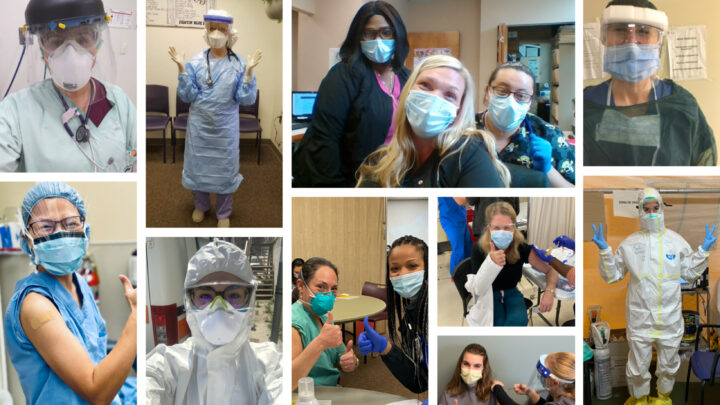
After putting in years of training, sleepless rotations and nonstop patient loads, you might feel hesitant to leave behind a career as a physician assistant (PA). But scrolling job boards between shifts or wondering if there’s something else you could be doing with your PA degree is a common experience. In a Sermo poll, 21% of surveyed advanced practice providers (APPs)— including PAs — said they’re actively seeking new opportunities and another 25% are exploring their options.
Rest assured, your next step can help you find better work-life balance or renew your drive. Whether it’s consulting for a biotech company, creating health content or shaping policy behind the scenes, there are plenty of ways to stay connected to medicine while building a life that feels more sustainable.
Why PAs seek alternative careers
As a physician assistant, you’re trained as a generalist to diagnose illnesses, develop and manage treatment plans and prescribe medications. PAs work in virtually every specialty, from emergency departments to family practices. For some, the positives outweigh the negatives. “Even though [it] is a demanding and stressful career, it is quite rewarding to see patients progress and improve,” writes one PA and Sermo member.
As for PAs who desire a career change, they often wish to escape feeling overworked. In a poll conducted on Sermo, 43% of APPs said they’re considering a change mainly due to burnout and clinical stress as their primary motivator, while another 25% cite a desire for better work-life balance. “I’ve seen burnout take many forms in my career and of others,” notes one PA on Sermo. “The biggest red flag is a general sense of uncaring or that what they do won’t make a difference.” Beyond burnout, you might want a role that offers greater professional growth or the flexibility to work remotely.
Other PAs transition into non-clinical roles with the desire to become advocates for their profession, working to influence healthcare policy and expand the PA scope of practice. In a 2024 report, the National Commission on Certification of Physician Assistants (NCCPA) shared that approximately 8.7% of PAs are looking to move into non-clinical health-related positions.
Industry and research roles
If you’re ready to swap your scrubs for business attire, the pharmaceutical, biotech and medical device industries offer some of the most intellectually stimulating non-clinical jobs. However, the transition sometimes comes with a pay cut compared to the median PA salary of approximately $207,000 as reported by Glassdoor data.
Medical Science Liaison (MSL)
As a medical science liaison, you serve as a link between a company and key opinion leaders (KOLs) in the medical community. You’re not a salesperson; but rather a scientific peer responsible for educating healthcare professionals about your company’s products and the science behind them. The role typically involves significant travel, but it also offers a high degree of autonomy. It has a median salary of $204,000 in the U.S., according to Glassdoor data.
Clinical Research Associate/Coordinator (CRA)
Clinical research drives medical advancement, and PAs can play a leading role. As a CRA, you manage clinical trials, ensuring they are conducted according to regulatory and ethical standards. Your responsibilities include monitoring trial sites, managing data collection and communicating with investigators. CRAs have a median salary of $113,000 in the U.S., per Glassdoor.
Regulatory affairs specialist
Life science companies are tasked with navigating the complex maze of the FDA and other global regulatory bodies. A regulatory affairs specialist ensures that new drugs, devices, and biologics meet all legal and scientific requirements for approval. This path is ideal if you consider yourself analytical and enjoy the intricacies of policy and law, but may require you to earn additional qualifications. Glassdoor data places the median salary for regulatory affairs specialists in the U.S. at $111,000.
Leadership and public health administration roles
If your goal is to shape the healthcare system from the inside, leadership and administrative roles offer a powerful platform. While some positions may require additional education, like an MBA or MHA, your PA degree provides a strong foundation.
Chief Medical Informatics Officer (CMIO)
A CMIO acts as the bridge between clinicians and IT departments. You would lead the strategy and implementation of health information systems, like electronic health records (EHRs), ensuring they are user-friendly for staff and effective for patient care. A PA’s understanding of clinical workflows is essential for optimizing these systems. CMIO roles typically require experience in IT or a master’s degree in health informatics.
Hospital administrator/manager
Hospital administrators oversee the operational and financial health of a healthcare facility or department. They manage budgets, lead strategic initiatives, and ensure regulatory compliance. PAs in these roles can effect change on a large scale, from improving patient safety protocols to streamlining departmental workflows.
One PA on Sermo shared that they’re considering hospital leadership roles, but has found that they can be tough to land as a PA. “For whatever reasons, hospitals seem to preference nurses and NPs for leadership roles as well,” they write. “I think I would need to get an MBA or MHA to get an edge, so trying to decide if doing one of those or MD/DO is what I want.”
Public health policy analyst
A policy analyst researches, develops, and evaluates health policies for government agencies. This is a chance to address public health challenges head-on, from improving healthcare access to managing disease outbreaks. It’s an ideal role if you’re passionate about making a broad, societal impact.
Organizational leader
Leadership roles within professional organizations like the American Academy of Physician Associates (AAPA) allow you to advocate directly for the PA profession. You could work on legislative initiatives, develop professional standards or create educational resources for your peers.
Entrepreneurship and specialized jobs
If you have an independent streak, entrepreneurship offers autonomy and flexibility. One PA on Sermo sees an opportunity to follow multiple passions simultaneously: “I would probably be one of those ‘little bit of everything’ entrepreneurs—maybe own a dance studio, be a fitness coach, work with high schoolers/young adults on career-readiness skills.”
Alternatively, you can follow a path that’s related to your current role, whether it’s in aesthetics, consulting or education. These are some of the best options to consider:
Aesthetic procedure provider
The demand for cosmetic procedures like Botox, fillers and laser treatments is increasing, with the market for medical aesthetics in the U.S. and Canada on a steady climb since 2019, according to a 2024 report from McKinsey & Company. PAs can capitalize on this trend by opening their own medical spa or joining an existing practice. This field combines clinical skill with an artistic eye. Keep in mind that specialized certification and adherence to state-specific licensing regulations are required to practice. For instance, in California, PAs can only administer injections under the supervision of a physician.
Medical-legal consultant/expert witness
Your clinical expertise is invaluable in the legal world. As a medical-legal consultant, you can review cases, provide expert opinions and testify in court on matters related to standards of care. This role requires sharp analytical skills and the ability to communicate complex medical information clearly to a non-medical audience.
CME course creator/instructor
If you have a passion for teaching, you can turn it into a business. PAs can create and sell Continuing Medical Education (CME) courses, write for medical publications or become instructors for PA programs.
Independent health coach
Through health coaching, you can focus on helping clients achieve their wellness goals through personalized guidance and support. Your deep understanding of health qualifies you to offer credible, evidence-based coaching on topics like nutrition, fitness and chronic disease management.
Flexible and remote job options
Perhaps you’re not ready to make a complete career change. If you want to dip your toes into the world of non-clinical work, reduce your clinical hours or simply gain some extra income, a variety of remote jobs are available. These roles allow you to explore new interests without leaving the security of your current position.
Paid medical surveys
The expert opinions of healthcare professionals are always valuable. Sermo offers paid medical surveys that you can complete online in your spare time. It’s a simple, low-commitment way to monetize your clinical knowledge and influence industry trends. You can share your unique insights on a variety of topics such as treatment protocols, patient management and more — all while earning extra income for your time. Sign up now to start exploring the earning community built for APPs like you.
Telemedicine/virtual triage
Telemedicine has increased in popularity, creating numerous opportunities for PAs to provide virtual care from their homes. You can work for established telehealth companies or even start your own virtual practice, offering consultations for non-emergency conditions.
Medical writing/editing
If you have a talent for writing, you can find freelance or full-time work as a medical writer. This can involve creating or editing content for pharmaceutical companies, medical journals, health websites or educational institutions.
Utilization Review
Insurance companies hire PAs to conduct utilization reviews, where you assess the medical necessity of treatments and procedures. This role is typically remote and offers a stable, non-patient-facing career that still relies heavily on your clinical judgment.
Sermo as a means for achieving goals
A career transition can be daunting, but you don’t have to do it alone. The journey toward a non-clinical role often begins with exploration, networking and building new skills. In some cases, continued education is helpful. “While medicine has to be a lifelong learning endeavor by its nature, additional education also gives us a greater sense of control over our career,” writes a PA and Sermo member.
Sermo can support you every step of the way, linking you with peers who have successfully made these transitions. You can ask for candid advice, learn about different career paths, and get transparent, real-world insights that you won’t find anywhere else. It’s a place where physician assistants share the realities, challenges, opportunities, and pivotal turning points that shaped their journeys.
Furthermore, Sermo’s paid medical surveys offer a flexible way to supplement your income. You can use the extra cash you earn to help pay off student loans, fund a certification course for your new career venture, or simply create a financial cushion while you plan your future. Sermo empowers you to take meaningful steps toward your goals, whether you’re refining your career path or starting a brand-new chapter.
The bottom line
The rigorous, generalist training that defines the PA profession makes you valuable in a wide range of non-clinical settings. Your ability to think critically and manage complex information opens up countless doors for professional fulfillment beyond the exam room.
Whether you’re drawn to the strategic challenges of the corporate world, the systemic impact of public health, or the creative freedom of entrepreneurship, there is a path for you. A smart first step is to network with those already in your desired field. Join the Sermo community today to connect with peers and explore your options.















